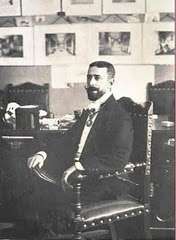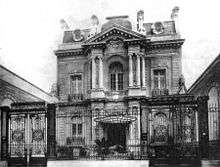Alejandro Christophersen
| Alejandro Christophersen | |
|---|---|
 Alejandro Christophersen | |
| Born |
1866 Cádiz, Spain |
| Died |
1946 Buenos Aires, Argentina |
| Nationality | Argentine |
| Known for | Architect and artist |

Alejandro Christophersen (1866–1946) was an Argentine architect and artist of Norwegian descent who designed many important buildings in the city of Buenos Aires, including the renowned Anchorena Palace.
Biography
Christophersen was born in Cádiz, Spain in 1866, the son of the Norwegian Consul in that city. He studied architecture in Belgium and art in Paris. In 1888, he arrived in Buenos Aires and during his career as an architect gave the city many of its most important buildings.
He was a professor in the School of Architecture of the School of Natural and Exact Sciences in the University of Buenos Aires, and is considered to be one of the central figures of eclectic architecture in Argentina, where he was one of the founder members of the Central Society of Architects. His earlier works were influenced by French Second Empire architecture, though his later projects were Rationalist.
Christophersen was also an accomplished painter, and became well known for his impressionist portraits of local society ladies. He died in Buenos Aires in 1946.
Works
His most important works include:
- Astoria Hotel at 902 Avenida de Mayo, 1895.
- Façade of Café Tortoni in Avenida de Mayo, 1898.
- Private residence for Adela Unzué de Leloir at 1264 Libertad street, 1903 (since 1944 the headquarters of Círcolo Italiano).
- Russian Orthodox Church of the Holy Trinity at 323 Brasil street, 1905.
- Construction of Anchorena Palace at 761 Arenales street for the family of Mercedes Castellanos de Anchorena (today the headquarters of the Ministry of Foreign Affairs), 1910.
- Headquarters for the Argentine Association of Actors at 1762 Adolfo Alsina street, 1914.
- Buenos Aires Stock Exchange at 299 Sarmiento street, inaugurated 1916.
- Basílica of Santa Rosa de Lima at the junction of Belgrano Avenue and Pasco street, 1928-34.
- Transradio Building, Corrientes Avenue, 1940.
 Anchorena Palace |
 Buenos Aires Stock Exchange |
 Basilica of Santa Rosa de Lima |
Transradio Building |
External links
References
- Alberto Dodero & Philippe Cros. Argentina, The Golden Years, 1889-1939. El Ateneo, 2007.